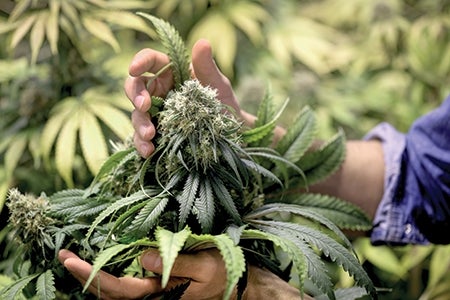With 28 days until it becomes legal to grow marijuana in Massachusetts, some in the medical marijuana industry are growing concerned about the slow launch of a new industry without a regulatory scheme in place.
Nicholas Vita, chief executive officer of Columbia Care, which holds three medical marijuana licenses in Massachusetts, raised concerns this week over the quality and oversight of unregulated home-grown marijuana and potential safety hazards posed by a surge in the use of special indoor lighting used to grow marijuana.
The existing medical marijuana industry is subject to guidelines aimed at preventing impurities in marijuana products and inspections designed to detect contaminants, including mold, mildew, heavy metals and the presence of non-organic pesticides.
While retail operations are much further off, the ballot law approved Nov. 8 authorizes on Dec. 15 the use of marijuana by individuals 21 and older, and authorizes people to possess up to one ounce of marijuana outside of their residences and up to 10 ounces of marijuana inside their residences, to grow up to six marijuana plants in their residences and to give one ounce or less of marijuana to a person at least 21 years old without payment.
“There’s a lot of soul searching that needs to occur to make sure this is done properly,” Vita told the News Service. “We’re sort of in a very grey zone here where we don’t really know what’s going on.”
It appears legislative leaders are ready to dig into the marijuana debate since several have indicated they hope to change the law. But near-term changes — including alterations to the home-grown marijuana provision — do not appear imminent since the Legislature is not scheduled to return to formal sessions until January and typically start sessions slowly. The ballot law calls for a Cannabis Control Commission under Treasurer Deborah Goldberg, but that regulatory body has not yet been established or funded.
During an appearance Sunday on WCVB’s “On the Record,” Senate President Stanley Rosenberg, who voted for legalization, said that in considering the tax rate in the law he hopes to learn how much it will cost to implement the law, public safety and public health costs, and the possibility of using marijuana as a “revenue source” for other expenditures. He also wants lawmakers to consider “challenges” associated with marijuana edibles and beverages in addition to the potential to limit levels of tetrahydrocannabinol, the component of marijuana responsible for the high it delivers.
“When I said that I was going to vote for the ballot question I also said that we had to go in and fix it and perfect it,” Rosenberg said. He added, “We have to follow the will of the voters. But we also have to be responsible here. On a ballot question this complicated, people are voting on the principle, they’re not voting on all the fine details.”
Rosenberg said home-grow provisions are already in place in connection with medical marijuana. “I don’t believe people will be willing to get rid of home grown, but there may be some changes that would have to occur in that,” he said.
The state’s medical marijuana law, approved by voters in 2012, allows a “patient or the patient’s personal caregiver to cultivate a limited number of plants, sufficient to maintain a 60-day supply of marijuana,” if the marijuana is grown and stored in an enclosed and locked area.
Gov. Charlie Baker, who led the opposition to the ballot question that legalized marijuana, told the News Service on Thursday that he expects the home-grown provision to take effect on Dec. 15 as anticipated.
“Well, you gotta remember that when the Legislature is in informal session it just takes one (lawmaker) to stop something from getting done. So, I mean, as a practical matter I think it’s pretty unrealistic to assume that that wouldn’t go into effect as it’s scheduled to go into effect in December,” he said. “That was one piece of that 6,000-word ballot question that I think a lot of people understood straight out of the gate.”
Baker said he still believes there is “work that needs to be done on that ballot question to ensure public safety and public health,” but said his focus is now on implementing the law that about 54 percent of voters approved.
“I think the (House) speaker and the Senate president and I and everybody else are pretty committed to the idea that our job at this point is to make sure we follow through on the will of the voters here, which is to have a recreational marijuana market in Massachusetts and to do what we need to do to make sure that while we meet that requirement we continue to protect public health and public safety,” Baker said.

